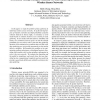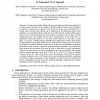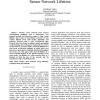279 search results - page 16 / 56 » Randomized k-Coverage Algorithms For Dense Sensor Networks |
AINA
2006
IEEE
13 years 9 months ago
2006
IEEE
In this paper, we study the problem of data gathering in multi-hop wireless sensor networks. To tackle the high degree of channel contention and high probability of packet collisi...
VTC
2007
IEEE
14 years 1 months ago
2007
IEEE
– Integration of beamforming to sensors is very beneficial for a reduction of transmission power consumption and for improvement of the overall system performance. Unfortunately,...
JPDC
2011
12 years 10 months ago
2011
: One important problem which may arise in designing a deployment strategy for a wireless sensor network is how to deploy a specific number of sensor nodes throughout an unknown ne...
WINET
2011
13 years 2 months ago
2011
Sleep scheduling, which is putting some sensor nodes into sleep mode without harming network functionality, is a common method to reduce energy consumption in dense wireless sensor...
JNW
2007
13 years 7 months ago
2007
— Wireless sensor networks must measure environmental conditions, such as temperature, over extended periods and therefore require a long system lifetime. The design of long life...



